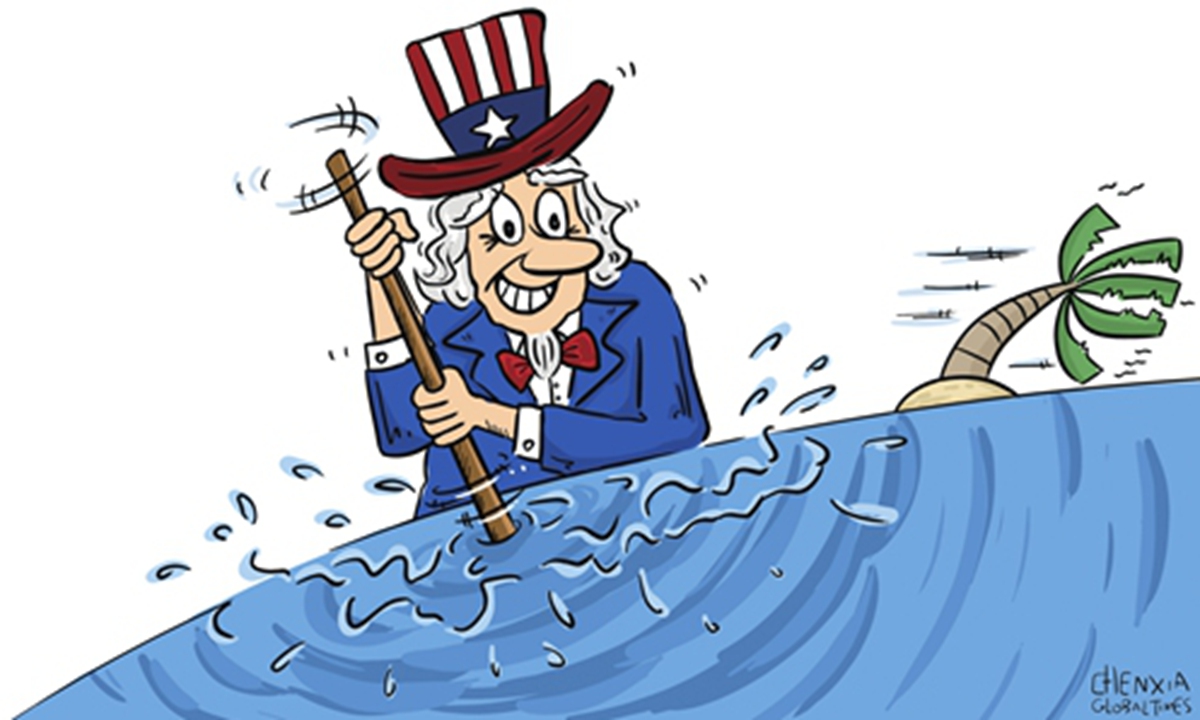US stands in the way of peace and stability in S. China Sea
By Li Kaisheng Source: Global Times Published: 2020/8/26 11:32:23

Illustration: Chen Xia/GT
The foreign ministers of the 10 members of the Association of Southeast Asian Nations (ASEAN) are expected to sit down for talks with their counterparts from China, Japan and South Korea and the US at the Foreign Ministers' Meetings on East Asia Cooperation in second half of 2020. The meetings were usually scheduled to late July and early August in the past few years, but have been delayed this year.
The meetings were designed to safeguard regional safety, stability and cooperation, but the US had used event to make waves with the South China Sea issue and jeopardize ties between China and ASEAN.
US Secretary of State Mike Pompeo in July said China's maritime claims over the South China Sea were "completely unlawful." In the first half of this year alone, the US military aircraft flew than 2,000 missions in the region. If Washington participates in the coming Foreign Ministers' Meetings on East Asia Cooperation, it is likely to stir up the South China Sea issue again.
Against this backdrop, China has recently maintained frequent interactions with ASEAN countries. The South China Morning Post (SCMP) reported China held a meeting with 10 Southeast Asian countries and conveyed its concerns about "high risk" military activities by "non-regional countries," a likely reference of the US. Chinese State Councilor and Foreign Minister Wang Yi on Thursday held talks with Indonesian Foreign Minister Retno Marsudi in South China's Hainan Province. China and Vietnam on Sunday held an event at the China-Vietnam border to commemorate the 20th anniversary of delimitation of the China-Vietnam boundary on land and the 10th anniversary of setting up pillars to demarcate the border.
These embody efforts by China and ASEAN to maintain regional security and counter US' attempts at undermining regional peace and the negotiations of a Code of Conduct (COC).
The SCMP reported ASEAN diplomats believe the early August meetings underline China's intention to keep its neighbors closer and push the US out of the picture.
It is not accurate to say "push" the US out of the picture. China has put forward the "dual-track approach" to resolve the South China Sea issue, which means that disputes related to the South China Sea should be addressed properly through negotiations and consultations among countries directly concerned, and China and the ASEAN countries should work together to safeguard peace and stability in the South China Sea. The US, lying on the other side of the Pacific, is neither a claimant in the South China Sea dispute, nor a party involved in the negotiation of COC. The word "push" is not appropriate in this context.
The so-called freedom of navigation, which Washington claims to defend in the South China Sea, is entirely created by itself. US frequently sending military aircraft to the region are moves of "stepping in" a region that is beyond its sphere. This leads to spats between China and ASEAN and changes in regional stability.
ASEAN members should be clearly aware of situation in the South China Sea and the real intentions of the US. They should reach a conclusion with China based on the "dual-track approach."
A Chinese official expressed willingness to resume the COC negotiations and Wang said China stands ready to work with ASEAN countries to conclude the COC at an early date. This will promote regional peace and stability.
However, the negotiations of the COC have to overcome some factors. First, the US is reluctant to see its conclusion. As a result, it will spare no effort to block it. Second, some claimants may still hesitate on some tough issues and won't make the final decision soon. Lastly, the global pandemic will impair the efficiency of their communication. China's current positive and friendly ties with key claimants - Vietnam and the Philippines - lay good foundation to advance the negotiations. China and ASEAN members should ramp up their efforts to accelerate the process.
Economic cooperation between China and ASEAN has been improving. ASEAN became China's biggest trading partner in the first half of 2020. Objectively, closer economic cooperation will help both sides realize that they can construct a real community of a shared future with regional countries, rather than non-regional ones. The so-called security and territorial issues are not the fundamental obstacles of their bilateral ties. If ASEAN members are better aware of this fact, it will help them to be more rational on the South China Sea issue and realize a win-win result in COC negotiations and regional cooperation.
The author is deputy director at the Institute of International Relations, the Shanghai Academy of Social Sciences. opinion@globaltimes.com.cn
Posted in: ASIAN REVIEW,SOUTH CHINA SEA FOCUS,CHINA-US